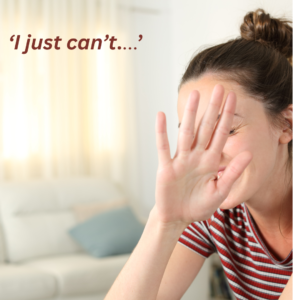….and how to maintain a sense of structure while school is out.
Before summer, you worried about maintaining the recovery routine during the school year: making sure that snacks were had during the school day (as best you could!) and that appointments were kept.
Now the summer holidays have arrived and with it – Freedom!
No routine – and, just as importantly, no getting everyone up early in the morning.

Everyone you speak to is focused on summer holidays, less worried about school and is generally happier. And the sun is shining – well, some of the time!
As a parent supporting a loved one in eating disorder recovery though you may be feeling the complete opposite of ‘Freedom’ and instead be filled with fear with lots of thoughts and questions going through your mind:
-
- Should we plan a family holiday? OR should we stay at home and focus on maintaining the current structure around food and exercise?
-
- How can we make sure that they maintain their food plan / nutritional rehabilitation– and still have morning and afternoon snacks when they’re having lie on’s and getting up later?
-
- Is my loved one going to be triggered by the “summer clothes” that expose more of their bodies? (A very common issue during eating disorder recovery)
-
- Is the time before holidays, when everyone talks about their “summer body” a triggering time for them?
-
- Are they going to be invited to the parties/barbeques/beach/family get-togethers?
-
- When they are invited to an event, are they ready for it?
-
- Thoughts that summer and holidays may just be too much for them.
We hear you!
While summer can be a great time of the year, it can be a particularly challenging time for those in eating disorder recovery. That was certainly my own experience (Deirdre).
We think that it is great that you have started thinking about it already!
As with most things around eating disorder recovery, the key solution to all this is good planning. Here are some tips to help you navigate summer:

Managing the lack of routine:
Everyone needs the break from routine that summer brings. By the time school or college finishes, everyone (parents and children) are generally exhausted. The down time and time to recharge is so important.
Remember though that routine is important to someone in eating disorder recovery – eating regularly can be an important habit to maintain.
If your loved one is already seeing a dietitian (and depending on their stage of recovery), it might be helpful to get some input from the dietitian around the summer routine. For example, how can your loved one perhaps add to their existing meals, deal with getting up later etc. as mid-morning and afternoon snacks might be more difficult to maintain (if they’re getting up later and having lunch later etc). Or is it advisable to maintain the existing routine? Again, the dietitian’s input can be invaluable here.
For our loved ones, having no strict routine can also mean too much time spent thinking – and this can also be detrimental to our loved one’s recovery, allowing space for some of the eating disorder thoughts to return. If they are too young to have a part-time job, is there something else that they can do for some of the summer – a course of some kind? Developing a hobby? Volunteering?
To holiday or not:
If you are thinking about going away, talk to the team that takes care of your child. First priority is to check if it is a good idea to go away at this stage of the recovery. If the treatment team agree that it’s a good time, again leverage off your loved one’s dietitian. Let them support and prepare you and your loved one in terms of how they can maintain their routine away from home. Let the therapist support them by discussing all the fears they have – and how they might address them
Yes, going away is potentially a high-risk situation, but only if you are not proactive.
Have a super detailed plan. What will they eat on holidays (if the food is likely to be less familiar to them). Plan ahead if you’re eating out – choose the restaurant in advance and check out the menu with your loved one (if this is something they find helpful). Suggest that they decide ahead of time what they’d like to eat, to ease the anxiety when they get there.
Get them to select an alternative meal too – just in case that item isn’t on the menu when you get there (Murphy’s Law!). Ensure that they have someone supportive sitting beside them – this is especially important if they are still struggling with eating out.
Maybe they are not ready to eat out? If that is the case, you must factor that in and still cook yourself. It can be helpful to bring snacks that they’re used to at home with you. These can be particularly helpful to have when travelling – flight delays and the unknown quantity that is airport food can be very anxiety provoking.
Make sure that you adjust activity levels to their recovery stage – would it be appropriate to go hiking for 4 hours in the heat? Or is this bicycle trip necessary? Again, getting the input from your child’s treatment team can be invaluable.
Make sure that the friends or family members you are planning the holidays with are not going to say the most triggering and unhelpful things possible (we know this is hard to control but try your best at educating them or selecting who you will travel with).
If you decide to stay at home, make sure that they don’t feel completely left out. Maybe there are some things that you can do to make the summer a bit more ‘normal’ and that are appropriate to the state of their health. Activities that they enjoy or day trips away from home.
Family outings/BBQ’s etc:
Again, planning is key here. Would your child like to attend the family gathering? How can you best plan this with them so that their anxiety levels are manageable?
Should they eat beforehand at home so that they don’t have to eat there and be triggered by the selection of foods available? Can you serve them at the BBQ or party and take the stress of the decision away from them? Can they eat in another room with you rather than with everyone else?
The key thing is to support your loved one and reduce the anxiety as much as possible. It may be that they don’t eat as much as they would at home. But, if they have managed a stressful social situation – and perhaps enjoyed it – that’s good enough for now. They can return to their normal food plan tomorrow.
Body Image in Summer:
For a lot of people struggling with an eating disorder, body image concerns can also be a challenge. Summer heightens these concerns – people are wearing less clothes in summer, there is much more (utterly ridiculous) focus on the ‘summer body’.
So what can we do to help?
Promote comfort. As we’ve said, summer clothes may be triggering, so encourage your loved one to wear the most comfortable clothes to minimise the challenge. It is better to wear something comfortable and go to an event than to avoid it because the clothes may be an issue.
Sometimes you have to stick to the routine of recovery and plan around it. Don’t let “summer” make you less vigilant
Be prepared, plan ahead and keep holding on to the hope. If this summer is more challenging than you might have expected, you and your loved one will learn from it.
We wish you a lovely sunny summer – wherever and however you spend it! And remember to reach out if you need support.
Zuzanna & Deirdre




